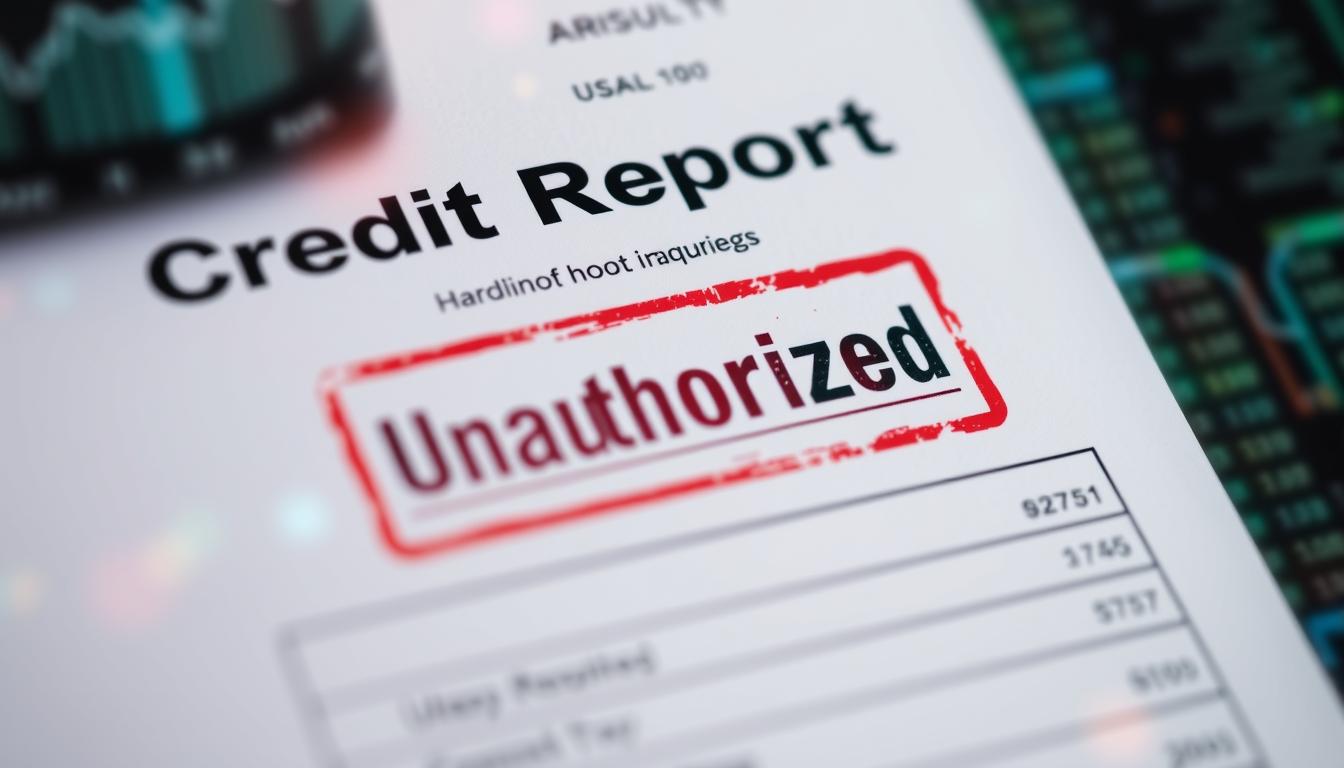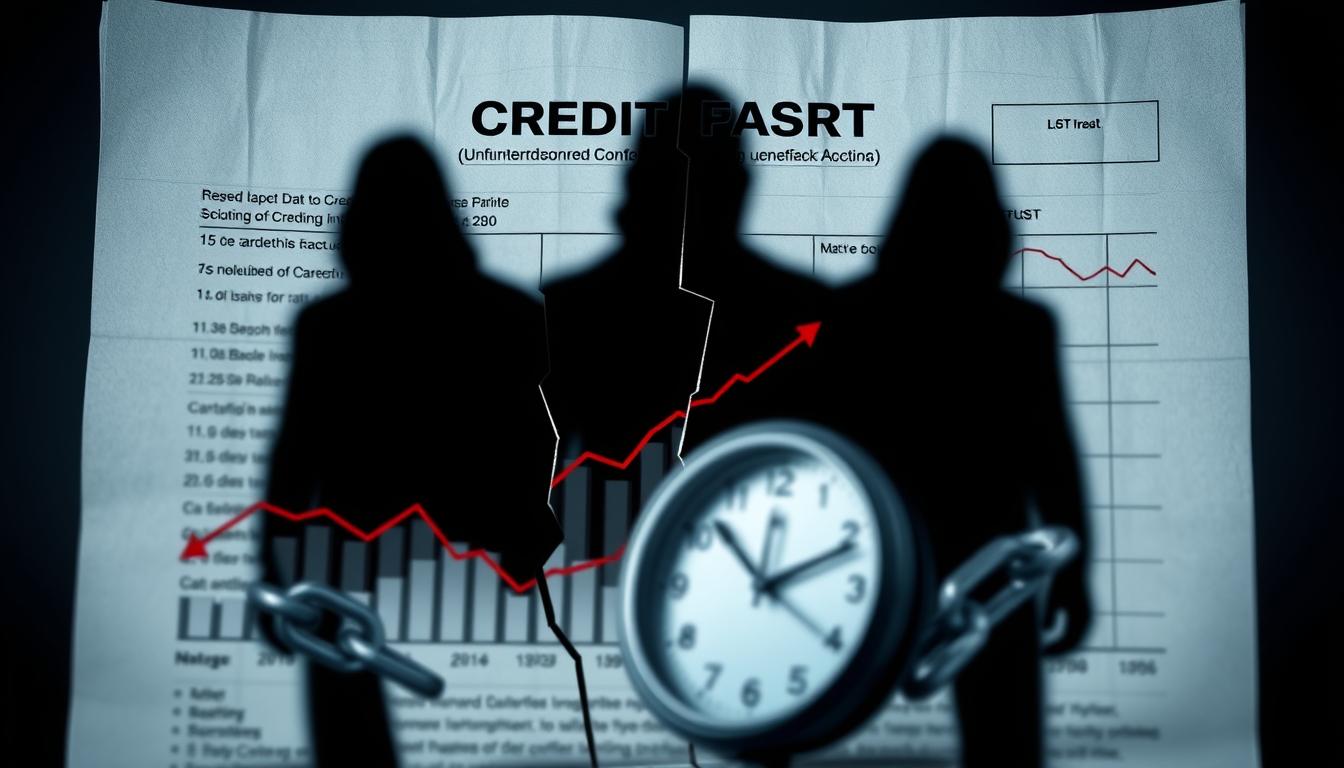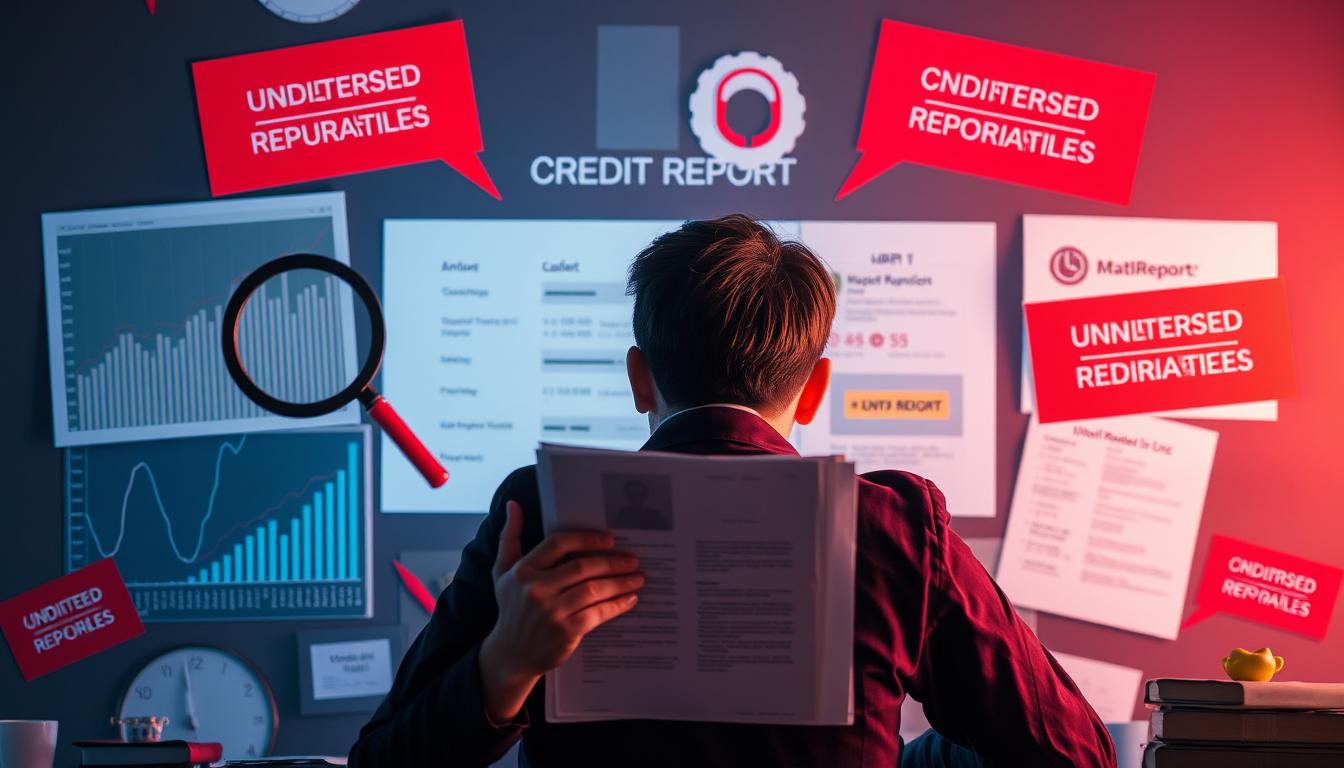An unauthorized hard inquiry on your credit report can be alarming. Hard inquiries happen when lenders check your credit history for applications. Some are valid, but others may result from identity theft or improper access.
If you spot an unfamiliar hard inquiry, act quickly. It’s crucial to safeguard your credit and financial health. Taking immediate steps can help protect your financial future.
Key Takeaways
- Understand what a hard inquiry is and the potential consequences of unauthorized credit checks
- Learn how to identify and dispute unauthorized hard inquiries on your credit report
- Explore legal options for addressing violations of your credit privacy
- Discover steps to protect yourself from future unauthorized credit inquiries
- Discover how to restore your credit and prevent further damage
Understanding Hard Inquiries on Credit Reports
Hard inquiries can significantly affect your credit history. They happen when you apply for new credit products. Lenders use them to assess your creditworthiness and decide on your application.
What Is a Hard Inquiry?
A hard inquiry is a thorough review of your credit report. It’s recorded on your credit report and can impact your credit score. Hard inquiries usually result from credit applications like mortgages, car loans, or credit cards.
Legitimate Reasons for Hard Inquiries
Hard inquiries can appear on your credit report for several valid reasons. These include applying for various types of loans, credit cards, or utility services.
- Applying for a new credit card
- Applying for a personal, auto, or home loan
- Applying for a mortgage
- Applying for a student loan
- Applying for a retail store credit card
- Renting an apartment or applying for a lease
- Applying for a new utility service (e.g., electricity, gas, or cable)
These hard credit checks are normal in the credit application process. They’re not usually concerning if you’re only applying for needed credit.

“Hard inquiries can impact your credit score, so it’s important to understand when and why they occur.”
Unauthorized Hard Inquiries: A Violation of Privacy
Unauthorized hard inquiries on your credit report are a serious breach of financial privacy. These inquiries happen without your consent and can harm your credit score. Protecting yourself from such violations is crucial.
Unauthorized credit checks, or “illegal credit report access,” occur when entities access your credit information without permission. This violates your trust and undermines the principles of credit privacy.
- Unauthorized credit checks can occur when a lender or other entity accesses your credit information without your consent.
- These inquiries are considered a violation of your credit privacy and can have negative impacts on your credit score.
- It’s important to be vigilant in monitoring your credit report and taking action if you discover any unauthorized inquiries.
Your personal financial information’s confidentiality is a fundamental right. Any unauthorized access to this data should be taken seriously. Understanding these violations helps you protect your credit and financial future.
“Your credit report contains sensitive personal and financial information. Unauthorized access to this data is a breach of your privacy and should not be taken lightly.”

Potential Consequences of Unconsented Credit Checks
Unauthorized credit checks can hurt your credit score and personal security. Knowing these risks is key to protecting your financial health. Let’s explore the main issues that can arise.
Impact on Credit Scores
Hard inquiries from unauthorized checks can lower your credit score. Each inquiry may drop your score by a few points. Multiple inquiries in a short time can cause significant credit score impact.
This can make getting loans or credit cards harder. It may also lead to less favorable interest rates on future borrowing.
Identity Theft Concerns
Unauthorized checks might signal identity theft. Criminals could use your info to apply for credit. This can cause credit score damage and credit report impact.
Fixing these issues can be tough and time-consuming. You may need to work hard to restore your credit and protect your identity.
| Potential Consequence | Impact |
|---|---|
| Credit Score Damage | Lowered credit score, making it harder to obtain loans or credit cards |
| Identity Theft | Fraudulent use of personal information, leading to further credit report issues |
Stay alert to guard your finances against unauthorized credit checks. Know the risks and take steps to protect your credit and identity. Your financial future depends on it.

Identifying Unauthorized Hard Inquiries
Checking your credit report often helps spot unauthorized hard inquiries. These can affect your credit score and finances. Credit monitoring keeps you aware of any issues.
Reviewing Credit Reports Regularly
Look at reports from Experian, Equifax, and TransUnion yearly. This helps you find strange activity like unauthorized hard inquiries on your credit file.
Examining reports closely reveals mistakes, including unapproved hard inquiries. Quick action maintains a healthy credit profile. It also guards against identity theft risks.
| Credit Bureau | Free Annual Credit Report | Paid Monitoring Service |
|---|---|---|
| Experian | ✓ | ✓ |
| Equifax | ✓ | ✓ |
| TransUnion | ✓ | ✓ |
Regular credit report checks keep you informed about unauthorized activities. This lets you take steps to fix issues. It ensures your credit info stays accurate.

hard inquiry on credit report without permission
Hard inquiries on credit reports without consent are a major concern for consumers. These non-consensual credit inquiries can harm creditworthiness and financial health. They’re also known as unwarranted credit pulls or unsolicited credit report checks.
A hard inquiry by a lender can temporarily lower a consumer’s credit score. This happens because hard inquiries suggest the consumer is seeking new credit. Lenders may view this as a sign of financial stress.
Unconsented credit screenings violate privacy and can cause significant problems. They can make it harder to get financing for important purchases. In some cases, they may even lead to identity theft.
It’s vital for consumers to know their rights about non-consensual credit inquiries. Taking action to dispute and remove these inquiries can protect financial well-being. Regular credit report reviews help identify and address unwarranted credit pulls.
Steps to Take After Discovering Unauthorized Inquiries
Unauthorized hard inquiries on your credit report can be worrying. But don’t panic! There are steps you can take to address this issue. Let’s look at what you can do to protect your credit.
Disputing the Inquiry
First, dispute the unauthorized inquiry with the credit bureaus. Provide proof that you didn’t authorize the inquiry. The credit bureaus must investigate your claim.
If they find the inquiry invalid, they’ll remove it from your report. This process helps maintain the accuracy of your credit history.
Freezing Credit Reports
Freezing your credit reports is another crucial step. This prevents new credit accounts from being opened in your name. It’s an effective way to stop further unauthorized inquiries.
To freeze your credit, contact each major credit bureau separately. Here are the links to freeze your credit with each bureau:
- Experian credit freeze: www.experian.com/freeze/center.html
- Equifax credit freeze: www.equifax.com/personal/credit-report-services/credit-freeze/
- TransUnion credit freeze: www.transunion.com/credit-freeze
These actions can help protect your credit score. They also guard against future credit-related problems. Stay vigilant and act quickly to keep your credit safe.
Protecting Yourself from Future Unauthorized Inquiries
Credit monitoring services can protect you from unauthorized inquiries. They detect suspicious activity on your credit report. These services add an extra layer of protection for your finances.
Credit Monitoring Services
Credit monitoring services offer many features to keep your credit healthy. They provide key benefits to help you stay informed.
- Regularly reviewing your credit reports for any unauthorized hard inquiries or other suspicious activity
- Providing alerts when changes are detected on your credit reports, allowing you to take swift action
- Assisting with the dispute process if unauthorized inquiries are discovered
- Monitoring your credit score and providing insights into factors that may be impacting it
- Offering identity theft protection features to safeguard against identity-related fraud
A credit monitoring service can shield you from unauthorized credit checks. It helps you address issues quickly. This protection can maintain your credit standing and reduce risks.
| Service | Key Features | Pricing |
|---|---|---|
| Experian IdentityWorks |
| $9.99 – $19.99 per month |
| TransUnion Credit Monitoring |
| $19.95 – $39.95 per month |
| LifeLock |
| $9.99 – $29.99 per month |
Taking proactive steps with credit monitoring services safeguards your financial health. It protects you from unauthorized credit inquiries. Your financial well-being stays secure with these preventive measures.
Legal Options for Unauthorized Credit Report Access
Consumers have legal protection against unauthorized credit report inquiries. The Fair Credit Reporting Act (FCRA) safeguards credit privacy. These laws offer valuable recourse for credit report violations.
Disputing with credit bureaus is a key legal option. Consumers can challenge unauthorized hard inquiries on their reports. Credit bureaus must investigate and remove inaccurate or illegitimate entries.
For serious violations like identity theft, legal action may be necessary. Consumers can seek damages through courts using FCRA provisions. This helps protect credit report privacy and financial well-being.
To build a strong case, document all unauthorized access. Gather evidence and consult credit protection law experts. These steps help safeguard your credit report effectively.
Protecting Your Credit Report Rights
Consumers have the right to:
- Dispute any unauthorized hard inquiries on their credit reports
- Seek compensation for damages caused by credit report violations
- Freeze their credit reports to prevent future unauthorized access
- Utilize credit monitoring services to detect and address any suspicious activity
Know your legal options to fight credit report violations. Exercise these rights to protect your credit from unauthorized access. Stay informed and take action when needed.
“The key to safeguarding your credit report is to be vigilant, document any violations, and take decisive legal action if necessary.”
Restoring Credit and Preventing Further Damage
Rebuilding credit after unauthorized hard inquiries is vital. Start by disputing inaccurate inquiries with credit bureaus. Submit a formal dispute with supporting documents and track the resolution.
Your credit score should improve once unauthorized inquiries are removed. Regular credit report reviews are crucial. Set up credit monitoring services to spot new unauthorized activity quickly.
Consider placing a credit freeze on your reports. This limits access to your credit information. It also helps protect against future identity theft.
Restoring credit takes time and effort. With the right steps, you can regain control. Address unauthorized inquiries and take proactive measures. This ensures your creditworthiness is accurately reflected.

